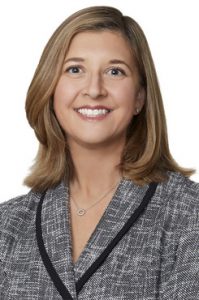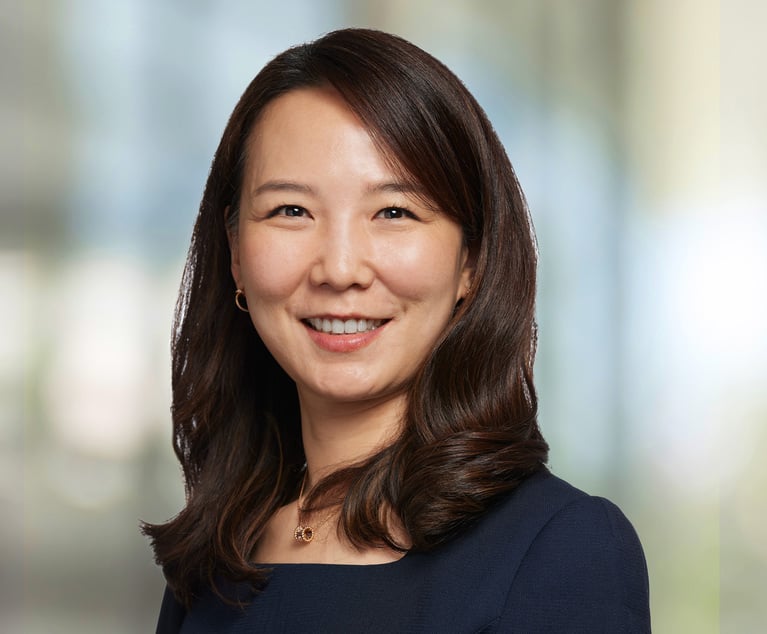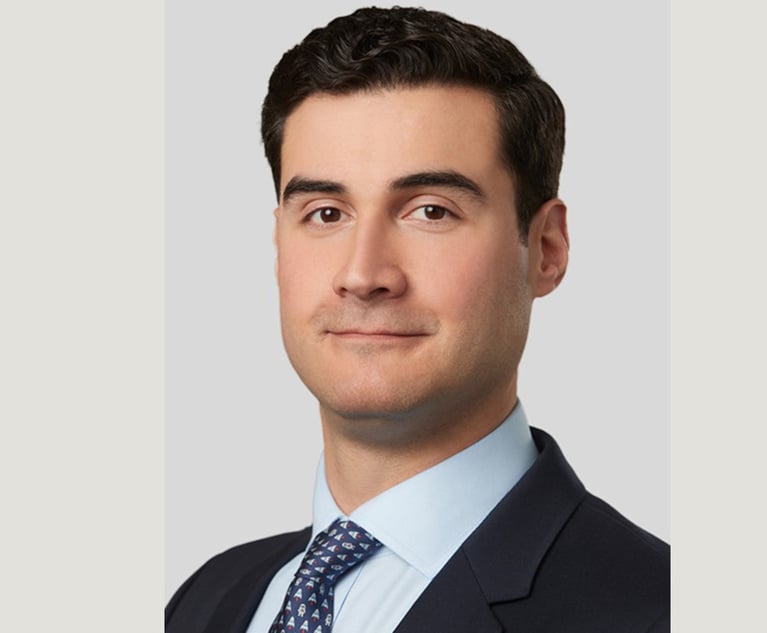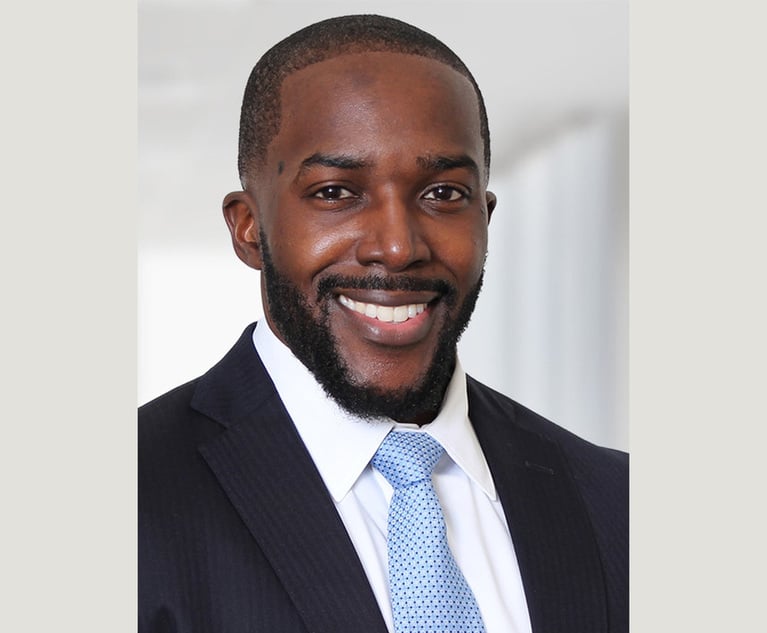How I Made Partner: Axinn, Veltrop & Harkrider's Jeny Maier
"It's hard to promote yourself and your practice if you aren't passionate about the work that you do. Make sure that the people around you can see that energy and drive."
June 19, 2019 at 02:23 PM
4 minute read
Jeny Maier, 40, Axinn, Veltrop & Harkrider
Office: Washington, D.C.
Practice area: Antitrust.
Law school and year of graduation: The George Washington University Law School, 2005.
How long have you been at the firm? Four years in August.
How long were you an associate at the firm? About a year and a half. I joined as a senior associate in August 2015 and was promoted to counsel in 2017 and then partner in 2018.
Were you an associate at another firm before joining your present firm? I was previously an antitrust associate at Morrison & Foerster in D.C. from 2005 until I joined Axinn in 2015.
What year did you make partner at your current firm? 2018.
What's the biggest surprise you experienced in becoming partner? That I would actually have a meaningful impact on basically all aspects of the firm and our practice—from recruiting to marketing to office administration issues—I've felt like I've been able to make my views heard.
 What do you think was the deciding point for the firm in making you partner? I think it was me being able to demonstrate that not only did I have the substantive legal knowledge to do the work and give timely, prudent and practical advice to our clients, but also that I was able to manage complex projects and motivate teams of associates and other professionals in order to achieve successful outcomes for our clients.
What do you think was the deciding point for the firm in making you partner? I think it was me being able to demonstrate that not only did I have the substantive legal knowledge to do the work and give timely, prudent and practical advice to our clients, but also that I was able to manage complex projects and motivate teams of associates and other professionals in order to achieve successful outcomes for our clients.
Describe how you feel now about your career now that you've made partner. I enjoy the autonomy that it brings, although as professionals in a client service field, we're still subject to some unpredictability when client needs arise. While my day is now filled with more than just legal issues for my clients, I enjoy dealing with the business management aspects of my job.
What's the key to successful business development in your opinion? A combination of maintaining your profile as an expert in the field and maintaining good relationships with people that you work with. In the antitrust world, it's quite common to get referrals from other lawyers that you've worked with in the past (e.g., as co-counsel in a litigation or even former colleagues), and so having a good reputation and personal relationships with fellow members of the bar is key.
What's been the biggest change, day-to-day, in your routine since becoming partner? I'm not sure that I've changed my routine all that much as a result of becoming partner. Perhaps, in addition to paying close attention to business news and legal developments in my clients' industries, I am also paying a lot more attention to the news in the legal industry, now that I am so much more involved in the business side of being a successful law firm.
Who had the greatest influence in your career that helped propel you to partner? Outside of my current partners, the person who had a great influence on my development as an antitrust lawyer is Brad Lui, a partner at Morrison & Foerster. Brad and I worked together almost constantly for 10 years, starting from the beginning of my career as a first-year associate. He offered me challenging assignments, gave me numerous opportunities to take ownership of projects and be visible to the client, and was a fun and collaborative person to work with. (And if you're looking for advice on navigating airports, or need vacation or restaurant recommendations, there's nobody better.)
What's the best piece of advice you could give an associate who wants to make partner? The job is not easy, and often requires that you work long and unpredictable hours when your clients need you, and so to be successful, you really have to enjoy what you do. It's hard to promote yourself and your practice if you aren't passionate about the work that you do. Make sure that the people around you can see that energy and drive.
This content has been archived. It is available through our partners, LexisNexis® and Bloomberg Law.
To view this content, please continue to their sites.
Not a Lexis Subscriber?
Subscribe Now
Not a Bloomberg Law Subscriber?
Subscribe Now
NOT FOR REPRINT
© 2025 ALM Global, LLC, All Rights Reserved. Request academic re-use from www.copyright.com. All other uses, submit a request to [email protected]. For more information visit Asset & Logo Licensing.
You Might Like
View All
How I Made Practice Group Chair: 'Collaboration Actually Makes the Job Fun,' Says Zachary Lerner of Troutman Pepper Locke

How I Made Partner: 'Be Open With Partners About Your Strengths,' Says Ha Jin Lee of Sullivan & Cromwell

How I Made Partner: 'Avoid Getting Stuck in a Moment,' Says Federico Cuadra Del Carmen of Baker McKenzie

How I Made Partner: 'Find Your Niche and Become the Go-To Person,' Says Shawn Hendricks of Stradley Ronon Stevens & Young
Trending Stories
Who Got The Work
J. Brugh Lower of Gibbons has entered an appearance for industrial equipment supplier Devco Corporation in a pending trademark infringement lawsuit. The suit, accusing the defendant of selling knock-off Graco products, was filed Dec. 18 in New Jersey District Court by Rivkin Radler on behalf of Graco Inc. and Graco Minnesota. The case, assigned to U.S. District Judge Zahid N. Quraishi, is 3:24-cv-11294, Graco Inc. et al v. Devco Corporation.
Who Got The Work
Rebecca Maller-Stein and Kent A. Yalowitz of Arnold & Porter Kaye Scholer have entered their appearances for Hanaco Venture Capital and its executives, Lior Prosor and David Frankel, in a pending securities lawsuit. The action, filed on Dec. 24 in New York Southern District Court by Zell, Aron & Co. on behalf of Goldeneye Advisors, accuses the defendants of negligently and fraudulently managing the plaintiff's $1 million investment. The case, assigned to U.S. District Judge Vernon S. Broderick, is 1:24-cv-09918, Goldeneye Advisors, LLC v. Hanaco Venture Capital, Ltd. et al.
Who Got The Work
Attorneys from A&O Shearman has stepped in as defense counsel for Toronto-Dominion Bank and other defendants in a pending securities class action. The suit, filed Dec. 11 in New York Southern District Court by Bleichmar Fonti & Auld, accuses the defendants of concealing the bank's 'pervasive' deficiencies in regards to its compliance with the Bank Secrecy Act and the quality of its anti-money laundering controls. The case, assigned to U.S. District Judge Arun Subramanian, is 1:24-cv-09445, Gonzalez v. The Toronto-Dominion Bank et al.
Who Got The Work
Crown Castle International, a Pennsylvania company providing shared communications infrastructure, has turned to Luke D. Wolf of Gordon Rees Scully Mansukhani to fend off a pending breach-of-contract lawsuit. The court action, filed Nov. 25 in Michigan Eastern District Court by Hooper Hathaway PC on behalf of The Town Residences LLC, accuses Crown Castle of failing to transfer approximately $30,000 in utility payments from T-Mobile in breach of a roof-top lease and assignment agreement. The case, assigned to U.S. District Judge Susan K. Declercq, is 2:24-cv-13131, The Town Residences LLC v. T-Mobile US, Inc. et al.
Who Got The Work
Wilfred P. Coronato and Daniel M. Schwartz of McCarter & English have stepped in as defense counsel to Electrolux Home Products Inc. in a pending product liability lawsuit. The court action, filed Nov. 26 in New York Eastern District Court by Poulos Lopiccolo PC and Nagel Rice LLP on behalf of David Stern, alleges that the defendant's refrigerators’ drawers and shelving repeatedly break and fall apart within months after purchase. The case, assigned to U.S. District Judge Joan M. Azrack, is 2:24-cv-08204, Stern v. Electrolux Home Products, Inc.
Featured Firms
Law Offices of Gary Martin Hays & Associates, P.C.
(470) 294-1674
Law Offices of Mark E. Salomone
(857) 444-6468
Smith & Hassler
(713) 739-1250









